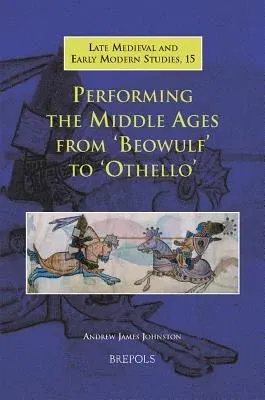Performing the Middle Ages from 'Beowulf' to 'Othello' traces the
dialogic nature of the relationship between the Middle Ages and
modernity. Arguing that modern beliefs in the alterity of the Middle
Ages stem from the Middle Ages' own processes of self-representation,
Johnston explores varieties of nostalgia through a wide selection of
texts. This volume spans an extensive chronological period with a view
to demonstrating how our notions of the medieval have been crucially
informed by the past itself. The study is focused on works which stage
that popular literary archetype - the nostalgic figure of the
aristocratic warrior - and argues that it is this image that provides a
structural model for so many modern perspectives on the Middle Ages. And
yet, in the Middle Ages this model was being deconstructed as it was
also being generated. By moving from the self-consciously archaic
heroism of Beowulf to the scathing comment on chivalric narrative
presented in Chaucer's 'Knight's Tale', Johnston's analysis offers an
intriguing insight into the way medieval texts engage in a continual
aesthetic and ideological critique of their own cultural moment. Using
Sir Gawain and the Green Knight and the Alliterative Morte Arthure as
examples of an incisive critique of the cult of subjectivity and of a
highly self-conscious desire for tradition, Johnston extends his
analysis to the early seventeenth century, and explores the ways in
which Shakespeare's Othello brilliantly deconstructs the very concept of
'Renaissance Man'. With its interest in issues of subjectivity, textual
performance, and the ideological self-awareness of medieval culture,
Performing the Middle Ages provides a scholarly and compelling
investigation into the Middle Ages' ability both to understand itself
and to shape (post)modern notions of the medieval.

